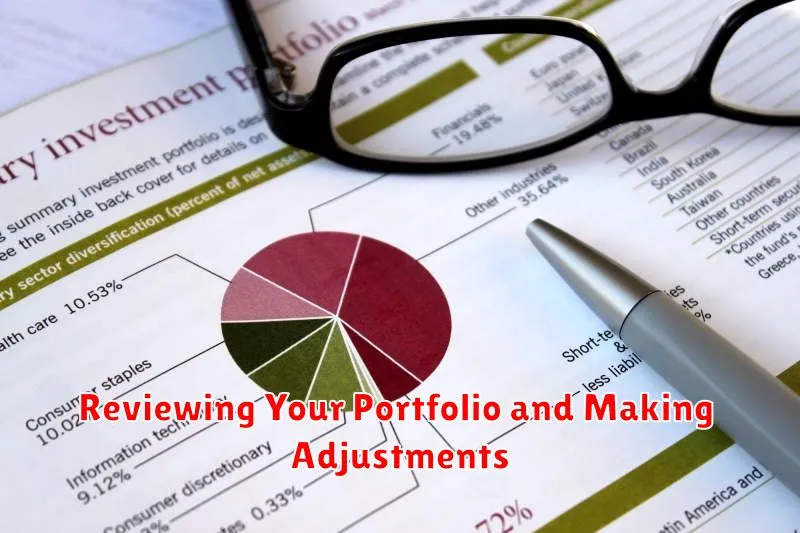Are you looking to secure your financial future and achieve your investment goals? With the complex world of finance, it can be overwhelming to navigate the path to financial success. This is where a financial advisor can be an invaluable asset, providing expert guidance and personalized strategies tailored to your unique needs. But with so many advisors out there, choosing the right one can feel like a daunting task.
This article serves as your guide to finding the best financial advisor for your investment goals. We’ll delve into the various types of advisors, the important questions to ask, and the key factors to consider when making this crucial decision. By understanding the landscape of financial advising, you can confidently select a partner who can help you navigate your financial journey and achieve your dreams.
Understanding Your Investment Needs and Goals
Before you even start looking for a financial advisor, it’s crucial to have a clear understanding of your investment needs and goals. What are you hoping to achieve with your investments? Are you saving for retirement, a down payment on a house, or your child’s education? Are you looking for short-term or long-term growth?
Once you know what you want to achieve, you can start to think about your risk tolerance. How comfortable are you with the possibility of losing money? Are you willing to take on more risk for the potential of higher returns, or do you prefer a more conservative approach?
It’s also important to consider your time horizon. When do you need to access your money? This will help you determine what types of investments are appropriate for you. For example, if you’re saving for retirement, you can afford to take on more risk than if you’re saving for a down payment on a house in the next few years.
By taking the time to understand your investment needs and goals, you’ll be able to make more informed decisions about your finances and choose the right financial advisor to help you reach your goals.
Types of Financial Advisors
Navigating the complex world of finances can be daunting, especially when it comes to making informed investment decisions. This is where financial advisors come in, offering their expertise and guidance to help you achieve your financial goals. But with so many types of financial advisors available, choosing the right one for your needs can be a challenge. Let’s delve into the different types of financial advisors and their specializations.
1. Fee-Only Financial Advisors
As the name suggests, fee-only advisors charge fees for their services, typically based on an hourly rate or a percentage of assets under management. They are not compensated by commissions from selling financial products, which eliminates potential conflicts of interest. This transparency allows them to provide unbiased advice, prioritizing your interests above all else.
2. Fee-Based Financial Advisors
Fee-based advisors can receive compensation through both fees and commissions. They may charge a flat fee, an hourly rate, or a percentage of assets managed. While they might also earn commissions from selling financial products, their primary focus remains on delivering personalized financial guidance. However, it’s crucial to understand their compensation structure and potential conflicts of interest.
3. Commission-Based Financial Advisors
Commission-based advisors are compensated primarily through commissions earned from selling financial products, such as insurance, mutual funds, or annuities. Their financial advice may be influenced by the products they are incentivized to sell. Therefore, it’s essential to be aware of their compensation structure and carefully consider their recommendations.
4. Robo-Advisors
Robo-advisors are automated platforms that provide financial advice and portfolio management services, often at a lower cost than traditional advisors. They use algorithms and sophisticated technology to create personalized investment portfolios based on your risk tolerance and financial goals. Robo-advisors are best suited for investors who prefer hands-off management and a cost-effective approach.
5. Certified Financial Planner (CFP®)
CFP® professionals are certified financial planners who have met rigorous education, experience, and ethical requirements. They provide comprehensive financial planning services, covering a wide range of topics, including investments, retirement planning, estate planning, and insurance. CFP® professionals are committed to upholding ethical standards and putting their clients’ interests first.
6. Registered Investment Advisor (RIA)
RIAs are required to register with the Securities and Exchange Commission (SEC) or state regulators. They are legally obligated to act in their clients’ best interests and provide full transparency in their compensation practices. RIAs offer a range of investment management services, including asset allocation, portfolio construction, and ongoing monitoring.
7. Chartered Financial Analyst (CFA)
CFAs are investment professionals who have passed rigorous exams covering investment analysis, portfolio management, and wealth planning. They possess deep financial knowledge and expertise in analyzing securities, evaluating investment strategies, and developing investment recommendations. CFAs are often employed by investment firms, hedge funds, or financial institutions, but they can also work independently as financial advisors.
Understanding the different types of financial advisors and their qualifications empowers you to make informed decisions about your financial future. Consider your specific needs, investment goals, and financial situation to choose the advisor best suited for your unique circumstances. A qualified and trusted advisor can be a valuable partner in navigating the complexities of investing and achieving your financial aspirations.
Credentials and Certifications to Look For
When seeking a financial advisor, it’s crucial to look for individuals who hold credible credentials and certifications. These designations signal expertise, commitment to professional development, and adherence to ethical standards. Here are some key credentials and certifications to consider:
Certified Financial Planner (CFP®): Widely recognized as the gold standard in financial planning, CFP® professionals undergo rigorous training and meet stringent experience requirements. They possess a comprehensive understanding of financial planning principles and are required to adhere to a strict code of ethics.
Chartered Financial Analyst (CFA®): CFA® charterholders are highly skilled in investment analysis, portfolio management, and wealth management. They excel in understanding market dynamics, evaluating investments, and developing customized financial strategies.
Certified Public Accountant (CPA): CPAs are well-versed in accounting, tax preparation, and financial reporting. Their expertise can be valuable for individuals with complex financial situations, especially those involving investments, tax planning, and estate planning.
Registered Investment Advisor (RIA): RIAs are subject to stricter regulatory oversight than brokers, and they are legally obligated to act in their clients’ best interests. While not a specific certification, the RIA designation signifies a higher level of fiduciary responsibility.
Series 65 and 66 Licenses: These licenses allow advisors to provide investment advice to individuals and institutions. They demonstrate competency in investment strategies, risk management, and regulatory compliance.
Remember, while credentials and certifications are important indicators of expertise, they are not the sole criteria for choosing a financial advisor. It’s also crucial to consider factors such as the advisor’s experience, communication style, and compatibility with your investment goals.
Fee Structures and Costs
When seeking financial guidance, understanding how advisors charge is crucial. Fees vary significantly, impacting your overall investment returns. Here’s a breakdown of common fee structures:
Hourly Fees: This is straightforward, charging for the time spent on your financial planning. It’s often used for specific services like estate planning or tax preparation.
Flat Fees: A fixed cost for a predefined service, like creating a financial plan or setting up a retirement portfolio. This provides clarity on upfront expenses.
Commission-Based Fees: Tied to the sale of financial products like insurance or mutual funds. While commission-based advisors may push specific products, they can offer valuable expertise in specific areas.
Asset-Based Fees: A percentage charged based on the value of your assets under management (AUM). This is common for advisors managing investment portfolios and can be transparent, with fees directly linked to the value they manage.
Fee-Only Advisors: These advisors charge solely for their advice, receiving no commissions on product sales. This eliminates potential conflicts of interest, prioritizing your best interest.
Hybrid Fees: Combining different fee structures, such as an AUM fee with an hourly rate for additional services.
Transparency is key. Discuss fee structures upfront with potential advisors to understand their compensation and how it aligns with your goals. Consider factors like the advisor’s experience, qualifications, and whether they charge for specific services or only manage assets.
Questions to Ask Potential Advisors
Finding the right financial advisor can be a daunting task. With so many options available, it can be difficult to know where to start. But don’t worry, by asking the right questions, you can weed out the unqualified advisors and find the best fit for your needs. Here are some key questions to ask potential advisors:
Financial Planning and Investment Strategy
1. What is your investment philosophy and how does it align with my goals? This question helps you understand the advisor’s approach to investing and whether it’s compatible with your risk tolerance and investment timeline.
2. How do you create investment portfolios? Learn about their process and whether it involves a specific strategy, such as indexing, active management, or a combination of both.
3. How will you measure my portfolio’s performance? Find out how they track progress, what benchmarks they use, and how they report on performance.
Fees and Compensation
4. What are your fees and how are they structured? Fees can vary, so it’s crucial to understand the advisor’s compensation model. This could include hourly rates, flat fees, commissions, or a percentage of assets under management (AUM).
5. Are there any hidden fees or costs I should be aware of? It’s important to ask about any additional fees that may apply, such as account maintenance fees or trading commissions.
Experience and Qualifications
6. What is your experience in financial planning and investment management? Ensure the advisor has sufficient experience and expertise in areas relevant to your goals.
7. What are your professional qualifications and licenses? Verify that they hold the necessary credentials, such as a Certified Financial Planner (CFP) or Chartered Financial Analyst (CFA) designation.
8. Can you provide references from previous clients? Talking to past clients can provide valuable insights into the advisor’s track record and client satisfaction.
Communication and Transparency
9. How often will we meet to review my portfolio and discuss progress? Establish a clear communication schedule and expectations for updates.
10. How will you keep me informed about market changes and portfolio adjustments? Understand how they handle communication and provide updates on market conditions and investment strategies.
Red Flags to Watch Out For
Finding the right financial advisor can be a crucial step in securing your financial future. While there are many reputable professionals out there, it’s essential to be wary of certain red flags that might indicate an advisor isn’t acting in your best interest.
Guarantees of Returns: Be skeptical of any advisor who promises guaranteed returns on investments. The investment market is inherently unpredictable, and no one can guarantee future performance.
High-Pressure Sales Tactics: A legitimate advisor will take the time to understand your needs and goals before recommending any specific investments. Avoid advisors who use aggressive or high-pressure tactics to push you into making decisions you’re not comfortable with.
Lack of Transparency: A trustworthy advisor will be open and transparent about their fees, investment strategies, and any conflicts of interest they may have. If an advisor is hesitant to provide clear and detailed information, it’s a major red flag.
Excessive Trading Activity: Frequent trading can generate high commissions for advisors, but it might not be in your best interest. Be cautious of advisors who recommend frequent trading without a clear explanation for their strategy.
Focus on Short-Term Gains: A long-term investment perspective is crucial for building wealth. Avoid advisors who focus solely on short-term gains, as this could lead to risky and potentially damaging investment decisions.
Lack of Qualifications: Ensure your advisor holds the necessary licenses and certifications to provide financial advice. Check their background and experience to ensure they have the knowledge and expertise to manage your investments effectively.
By staying alert to these red flags, you can increase your chances of finding a financial advisor who aligns with your values and priorities. Remember, a strong relationship with your advisor is essential for achieving your long-term financial goals.
Benefits of Working with a Financial Advisor
Navigating the complex world of finance can be daunting, especially when it comes to achieving your investment goals. A financial advisor can be your trusted guide, providing expert advice and personalized strategies to help you reach your financial aspirations. Here are some key benefits of working with a financial advisor:
Financial Planning Expertise: Financial advisors possess in-depth knowledge of financial markets, investment strategies, and tax laws. They can create a comprehensive financial plan tailored to your unique circumstances, goals, and risk tolerance. This personalized approach ensures your investments are aligned with your financial objectives.
Objectivity and Perspective: It’s easy to get caught up in emotions when it comes to money. Financial advisors offer a detached perspective, helping you make rational decisions free from biases. They can guide you through market fluctuations and provide objective advice, ensuring your investments are strategically managed.
Access to Resources: Financial advisors have access to a wide range of resources and investment opportunities that may not be readily available to individuals. They can connect you with specialized investment products, tax-advantaged accounts, and other financial tools to optimize your portfolio.
Accountability and Monitoring: A financial advisor acts as a constant accountability partner, helping you stay on track with your financial goals. They monitor your portfolio regularly, adjust your investment strategy as needed, and ensure you’re making progress towards your financial objectives.
Peace of Mind: Having a financial advisor by your side can provide significant peace of mind. Knowing that your investments are managed by a professional with expertise and experience can relieve stress and allow you to focus on other aspects of your life.
In conclusion, working with a financial advisor offers numerous benefits that can significantly impact your financial well-being. Their expertise, objectivity, resources, and accountability can help you achieve your investment goals, navigate market volatility, and build a secure financial future.
Tips for Choosing the Right Advisor for You
Choosing a financial advisor is a significant step in navigating your financial future. They can provide valuable guidance, helping you reach your investment goals and secure your financial well-being. However, with numerous advisors available, selecting the right one can feel overwhelming. To ensure you find a partner who aligns with your needs and aspirations, consider these key tips:
1. Define Your Needs and Goals
Before embarking on your search, clearly define your financial objectives. Are you looking for investment management, retirement planning, college savings, or estate planning? Identifying your specific needs will help you narrow down your search and find an advisor with the relevant expertise.
2. Understand Your Investment Style
Do you prefer a conservative, moderate, or aggressive investment approach? Your investment style is crucial in determining the right advisor for you. Seek an advisor who understands and aligns with your risk tolerance and investment preferences.
3. Check Credentials and Experience
Verify the advisor’s credentials and experience. Look for certifications such as a Certified Financial Planner (CFP®), Chartered Financial Analyst (CFA), or Certified Public Accountant (CPA). Ensure they have a proven track record and a deep understanding of your chosen investment area.
4. Inquire About Fees and Services
Discuss the advisor’s fees and services upfront. Understand the different fee structures, such as hourly rates, asset-based fees, or flat fees. Ensure you are comfortable with the pricing and the services included in the agreement.
5. Communication and Transparency
Effective communication is vital in any financial relationship. Choose an advisor who listens attentively, explains concepts clearly, and communicates regularly. Transparency regarding their investment strategies and performance is essential for building trust and confidence.
6. Seek Referrals and Reviews
Leverage your network and online resources for referrals and reviews. Seek recommendations from trusted friends, family members, or colleagues. Read online reviews and testimonials to gain insights into the advisor’s reputation and client experiences.
7. Schedule a Consultation
Before making a final decision, schedule a consultation with several potential advisors. This allows you to ask questions, discuss your financial situation, and get a feel for their approach and communication style. Choose an advisor who you feel comfortable working with and who inspires confidence in their abilities.
Remember, choosing the right financial advisor is a crucial decision that can significantly impact your financial future. Take the time to carefully consider your needs, research potential advisors, and seek a trusted partner who can guide you towards achieving your goals.
Building a Long-Term Relationship with Your Advisor

A strong advisor-client relationship is crucial for successful financial planning. While finding the right advisor is a good start, building a lasting relationship with them is equally important. This relationship should be built on trust, transparency, and open communication, fostering a collaborative approach to achieving your financial goals.
First and foremost, ensure that you are comfortable with your advisor’s communication style and their approach to financial management. Schedule regular meetings to discuss your progress, review your portfolio, and address any concerns. Don’t be afraid to ask questions and seek clarification on any aspect of your investment strategy.
Remember that your advisor’s role is to guide and support you, not to make decisions for you. You should actively participate in the financial planning process, understanding the rationale behind recommendations and decisions. Embrace a collaborative approach, bringing your own insights and goals to the table.
Trust is paramount in any long-term relationship, including your financial advisor. Ensure that your advisor adheres to ethical standards, prioritizing your best interests and providing transparent, unbiased advice. Openly communicate your expectations and concerns, allowing for a strong foundation of trust to flourish.
Building a long-term relationship with your financial advisor requires ongoing commitment from both parties. By fostering open communication, mutual respect, and a shared understanding of your financial aspirations, you can cultivate a partnership that contributes to your financial well-being for years to come.
Reviewing Your Portfolio and Making Adjustments

Once you’ve chosen a financial advisor, the next step is to review your existing portfolio. Your advisor will help you understand your current asset allocation, risk tolerance, and investment goals. They will also analyze your portfolio’s performance and identify areas for improvement.
Based on this review, your advisor will help you make adjustments to your portfolio. These adjustments could include:
- Rebalancing: This involves adjusting the asset allocation of your portfolio to ensure it aligns with your risk tolerance and investment goals.
- Adding or removing investments: Your advisor may recommend adding new investments to diversify your portfolio or removing investments that are no longer performing well.
- Adjusting your investment strategy: As your circumstances change, your investment strategy may need to be adjusted to reflect your current goals and risk tolerance.
Regular portfolio reviews are crucial for ensuring your investments are working for you. Your advisor can provide valuable guidance and support in making these adjustments and ensuring your portfolio remains aligned with your financial goals.
Staying Informed About Market Trends and Changes

A crucial aspect of successful investing is staying informed about market trends and changes. The financial landscape is constantly evolving, driven by economic indicators, geopolitical events, and technological advancements. To make informed investment decisions, it’s essential to stay ahead of the curve by actively seeking out relevant information and understanding its implications.
Reliable Sources: Regularly consult reputable financial news outlets, economic reports, and industry publications. These sources provide insights into macroeconomic indicators, market sentiment, and emerging investment opportunities.
Market Analysis: Analyze market trends by studying charts, graphs, and data to identify patterns and potential shifts. Understanding the drivers of market movements can help you anticipate potential opportunities and risks.
Expert Opinions: Seek out perspectives from seasoned financial professionals, economists, and analysts. Their insights can provide valuable guidance on navigating market volatility and making informed investment choices.
Continuous Learning: Invest in your own financial education by reading books, attending seminars, and pursuing online courses. Expanding your knowledge base will enhance your ability to assess market trends and make strategic decisions.
By staying informed about market trends and changes, you equip yourself with the knowledge and insights necessary to make sound investment decisions. This proactive approach contributes significantly to achieving your financial goals and securing your financial future.

